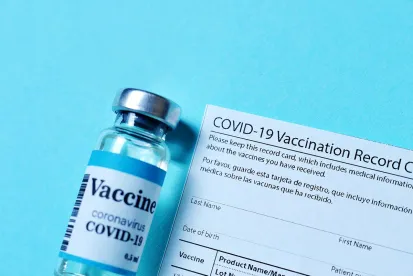EEOC Updates Guidance Regarding COVID-19 Vaccination Incentives and Reasonable Accommodations
The U.S. Equal Employment Opportunity Commission (EEOC) updated its “What You Should Know About COVID-19 and the ADA, the Rehabilitation Act, and Other EEO Laws” guidance document on May 28, 2021, providing clarity and welcome guidance for employers on a number of vaccination issues. As employers wrestle with decisions surrounding the COVID-19 vaccine, the recent guidance on the following points should be considered.
Mandatory Vaccination Policies for Employees Physically Entering the Workplace
According to the EEOC, federal laws do not prevent an employer from requiring all employees physically entering the workplace to be vaccinated for COVID-19, subject to the reasonable accommodation provisions of Title VII (religious accommodations) and the ADA (disability accommodations) and disparate impact considerations discussed below. Importantly, however, the updated guidance does not address mandatory COVID-19 vaccination policies for remote workers.
Relatedly, OSHA took steps to avoid disincentivizing workers from receiving COVID-19 vaccines. Under previous OSHA guidance, if an employer required employees to be vaccinated as a condition of employment, then any adverse reaction to the vaccine was considered work-related and potentially recordable on the employer’s OSHA 300 log depending on the severity of the reaction. That guidance was replaced with a pronouncement that OSHA will not require employers to record worker side effects from COVID-19 vaccination through May 2022.
Reasonable Accommodations
If employers have a mandatory COVID-19 vaccination policy, they must also comply with the “reasonable accommodation” provisions of the ADA and Title VII for those employees who are unable to receive the vaccine due to a disability or a sincerely-held religious beliefs. The updated guidance offers a few practical, and not exhaustive, reasonable accommodation suggestions, including telework, the continuation of face mask wearing, social distancing, modified shifts, periodic COVID-19 testing, and/or reassignment. The guidance also advises that employers may also need to accommodate employees who are not vaccinated due to pregnancy.
Employers are cautioned not to overlook the reasonable accommodation needs of fully vaccinated employees, including those with underlying medical conditions who are at a heightened risk of severe illness from COVID-19. The EEOC advises employers to follow the ADA interactive accommodation process, which “typically includes seeking information from the employee’s health care provider with the employee’s consent explaining why an accommodation is needed.”
Disparate Impact
The EEOC guidance reminds employers to bear in mind that some individuals or demographic groups may face greater barriers to receiving a COVID-19 vaccination than others, and as a result some employees may be more likely to be negatively impacted by a vaccination requirement. Employers with mandatory vaccine policies should assess the extent to which their policy may disproportionately screen out employees in protected categories including race, color, national origin, and age.
Vaccine Incentives
The updated guidance confirms that employers may offer vaccination incentives to employees who voluntarily provide documentation confirming they received the vaccine on their own at a pharmacy, public health department, or other health care provider in the community. An employer may also offer incentives to employees for voluntarily receiving a vaccination administered by the employer or its agent, but such incentives may not be so substantial as to be coercive. The EEOC’s rationale is that “[b]ecause vaccinations require employees to answer pre-vaccination disability-related screening questions, a very large incentive could make employees feel pressured to disclose protected medical information.” Unfortunately, the EEOC did not offer any examples, monetary or otherwise, of incentives that might be deemed either acceptable or coercive.
Employers who decide to offer vaccine incentives must also consider the Genetic Information Nondiscrimination Act (“GINA”). The EEOC says that employers “may offer an incentive to employees to provide documentation or other confirmation from a third party not acting on the employer’s behalf, such as a pharmacy or health department, that employees or their family members have been vaccinated” without violating GINA. However, the EEOC takes the position that under GINA an employer may not offer an incentive to an employee in return for an employee’s family member getting vaccinated by the employer or its agent because it “would require the vaccinator to ask the family member the pre-vaccination medical screening questions, which include medical questions about the family member.”
Employer Rights to Information and Confidentiality
Employers can request that employees provide confirmation of their COVID-19 vaccination status (e.g., vaccination record card or pharmacy records). If employers choose to obtain vaccination information from their employees, such information should be considered confidential pursuant to the ADA and kept separate from employee personnel files.







 />i
/>i

